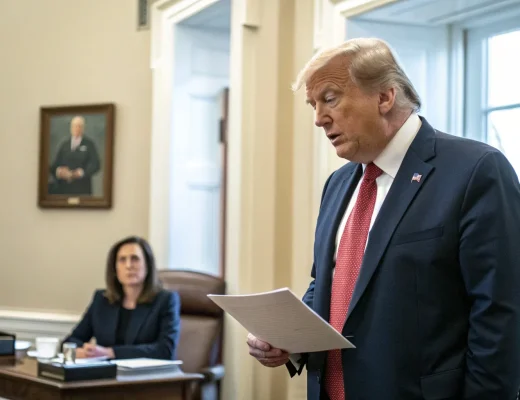President Donald Trump’s surprise plan to raise new H-1B application fees to $100,000 sparked alarm across the tech sector and among foreign workers on temporary visas. The announcement, made without detailed guidance, set off a day of confusion as companies paused hiring moves and legal teams rushed to assess the impact. The White House later clarified that the proposed fee would apply only to new applications, not to existing H-1B holders.
President Donald Trump’s surprise announcement that he would hike new H1-B application fees to $100,000 sparked fear and confusion among foreign workers.
It also sent the companies who employ them scrambling, forcing the White House to clarify that the fee would apply only to new applications, not existing H1-B workers.
Background on the H-1B Program
The H-1B visa allows U.S. employers to hire highly skilled foreign workers, often in technology, engineering, and healthcare. Demand is strongest among large and midsize tech firms, consulting companies, and research institutions. Each year the program is capped at 85,000 new visas, including an additional allotment for advanced degree holders.
Today, employers already face filing costs that run into the thousands of dollars per application, including base filing, training, and anti-fraud fees. Many also pay for expedited processing and legal support. A shift to a $100,000 fee would be a dramatic increase and could reshape how companies plan for hiring and project staffing.
Immediate Reaction From Workers and Employers
The timing and size of the proposal triggered anxiety among workers who are often tied to their current employers and face strict timelines for extensions and job changes. Immigration attorneys said even the hint of a six-figure fee could chill job offers or lead to canceled roles.
Employers responded by pausing new filings and requesting guidance. Human resources teams sought to determine which candidates would be affected and whether to bring forward or delay applications. Many firms also began modeling budget scenarios in case the policy moves ahead.
What the Clarification Means
The White House said the fee would apply only to new applications. That suggests workers already in H-1B status would not face the proposed charge for extensions or transfers. Still, key questions remain: when the fee would take effect, whether it would apply to cap-exempt filings, and how small businesses would be treated.
- New applicants appear to be the only group covered.
- Existing H-1B workers would avoid the fee for routine extensions.
- Effective dates and implementation details are not yet public.
Potential Impact on Hiring and Wages
A $100,000 fee would alter employer behavior. Companies might shift hiring to other countries, move roles offshore, or rely more on contractors abroad. Startups and smaller employers could be priced out of the program, giving larger firms a hiring edge.
Supporters of higher fees may argue that employers should invest more in training U.S. workers. Critics counter that sudden cost spikes could slow projects, reduce innovation, and raise prices. If the policy causes fewer applications, it may push salaries higher for certain roles, but it could also widen skill gaps where domestic supply is limited.
Legal and Policy Hurdles Ahead
Turning the proposal into policy would likely require formal rulemaking or legislation, depending on the mechanism used. That process invites legal challenges and public comment. Courts could be asked to weigh in on whether such a fee is lawful or excessive.
Universities and hospitals, which rely on specialty staff, may seek carve-outs. Industry groups are expected to lobby for lower rates, phased timelines, or exemptions for smaller employers.
What to Watch Next
Employers are preparing contingency plans while awaiting detailed guidance. Immigration counsel advise tracking the effective date, any grace periods, and whether the fee will differ by employer size or wage level. Workers are watching for changes to mobility rules, such as transfers between employers.
The broader question is how the U.S. will balance demand for skilled workers with concerns about domestic hiring. A six-figure filing fee would mark a sharp shift in that balance and could reset the market for high-skilled immigration.
The announcement has already changed behavior. The next steps—formal proposals, timelines, and potential legal tests—will determine whether this shock turns into lasting policy or a short-lived jolt.







